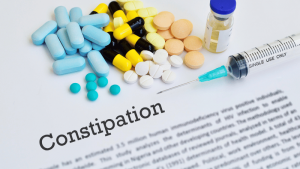Hemorrhoids are swollen veins in the lower rectum and anus that can cause uncomfortable symptoms. While hemorrhoids are common, especially among adults over 50, their connection to bowel changes like constipation is often misunderstood.1 There are various factors that can lead to swollen hemorrhoids, including straining while passing a stool or prolonged sitting. But what about the connection between constipation and hemorrhoids?
It’s not unusual to notice hemorrhoid symptoms while dealing with bowel movement changes. However, if you’re wondering which came first, the hemorrhoids or the change in bowel movement, the answer isn’t always straightforward. Constipation and hemorrhoids are often connected, and together, they can create a frustrating cycle.
If you’re struggling with constipation and hemorrhoids, it’s important to understand how these two issues are linked and what you can do to break the cycle.
Do Hemorrhoids Cause Constipation and Gas?
While hemorrhoids don’t directly cause constipation or gas, they can indirectly contribute to both. Here’s why hemorrhoids can lead to constipation:
- Constipation from hemorrhoids often happens when individuals hesitate to pass stool due to pain or irritation.
- Gas and bloating may occur when large internal hemorrhoids partially block the passage of gas, leading to a feeling of fullness or pressure.
The Connection Between Hemorrhoids and Constipation
Constipation occurs when someone has infrequent bowel movements or has to strain to pass stools. Straining places pressure on rectal veins, which can cause hemorrhoids to develop or worsen.
Internal hemorrhoids, located inside the rectum, may not be visible but can cause discomfort, bleeding, and irritation. In some cases, enlarged or prolapsed hemorrhoids can physically obstruct the anal canal, making bowel movements more difficult and contributing to constipation.
If left untreated, hemorrhoids and constipation can become a recurring cycle. That’s why it’s important to manage both conditions early with proper diagnosis and treatment.
What to Do When You Have Constipation and Hemorrhoids

Knowing what to do when you have hemorrhoids and constipation is the first step to preventing both of these issues from getting worse. Not only can hemorrhoids contribute to constipation, but constipation can also cause hemorrhoids. Managing constipation and hemorrhoids can help break this cycle.
Lifestyle Management for Constipation
It’s possible to reduce constipation by:
- Increasing fiber intake through high-fiber foods and supplements.
- Hydrating by drinking more water or other hydrating fluids, such as vegetable juices, clear soups, and herbal teas.
- Adding more physical activity to your daily routine, such as walking, Qigong, and yoga.
- Avoid prolonged sitting or straining as these habits aggravate both constipation and hemorrhoids.
Chronic constipation may also be linked to other conditions like IBS or diabetes. If symptoms persist despite lifestyle changes, speak with your doctor.
Minimally Invasive Treatment for Hemorrhoids
Medical treatment may be needed to relieve unwanted symptoms from internal hemorrhoids. USA Hemorrhoid Centers treats internal hemorrhoids through hemorrhoid artery embolization (HAE), an advanced, non-surgical procedure that can be performed on an outpatient basis. With HAE, patients can get fast relief from symptoms, including the discomfort and swelling that can lead to constipation.
If you’re wondering what to do when you have hemorrhoids and constipation that won’t go away, HAE may be the solution.
LEARN MORE ABOUT HAE TREATMENT
When to Seek Medical Help
If constipation persists or is painful, don’t ignore it. These symptoms can be signs of more serious medical conditions, and delaying treatment may lead to worsening hemorrhoids or other complications.
The experienced specialists at USA Hemorrhoid Centers can provide a comprehensive evaluation and a treatment plan dependent on your individual needs. Schedule a consultation at one of our nationwide hemorrhoid clinics near you today for lasting symptom relief.
FAQs About Constipation and Hemorrhoids
Can constipation cause hemorrhoids?
Constipation symptoms can increase the risk of hemorrhoids by putting pressure on anal or rectal veins during a bowel movement. This pressure can cause the veins to swell. If they remain swollen and enlarged, they can cause uncomfortable symptoms, including anal itching, mucus discharge, bleeding, and pain.
What helps with hemorrhoids and constipation?
Staying well-hydrated, eating a high-fiber diet, and maintaining regular physical activity can help soften stools and reduce straining, which in turn can ease hemorrhoid symptoms.
Can hemorrhoids cause gas?
Hemorrhoids can indirectly contribute to gas if they partially block the anal canal. This blockage can prevent gas from leaving the body, leading to a gassy feeling and bloating.
Do Hemorrhoids Cause Diarrhea?
Hemorrhoids are not a direct cause of diarrhea. However, some hemorrhoid symptoms can mimic the sensation of having a loose, uncontrolled stool. Large internal hemorrhoids can also make it feel like you have to have an urgent bowel movement.
References:
1. National Institute of Diabetes and Digestive and Kidney Diseases. (n.d.). Definition & facts for hemorrhoids. U.S. Department of Health and Human Services.









